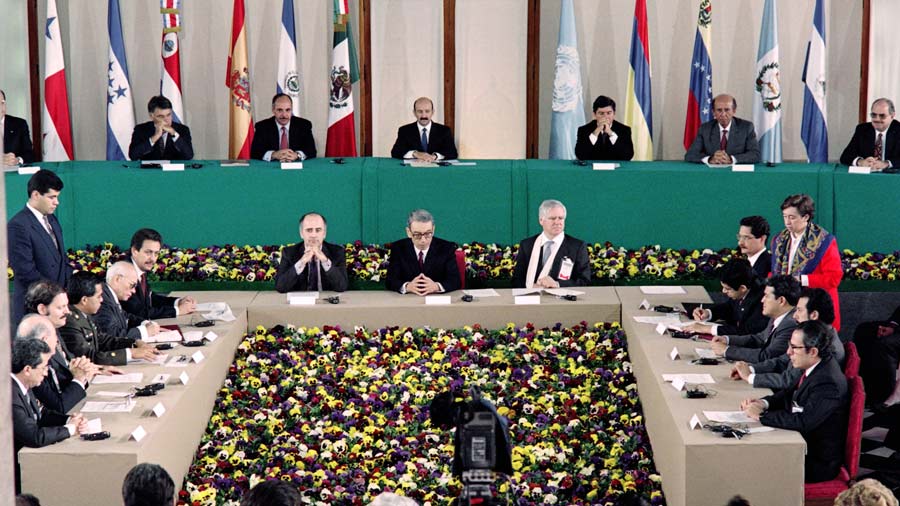
El Diario de Hoy joins the anniversary of one of the most important milestones that opened the door to building democracy and freedom.
29 years ago, one day less, the silence of the guns was signed and that’s no small matter. For a country that has faced oppression, political violence, persecution of dissent, and where the political and economic system was designed to avoid major reforms and silence opposition voices, it is turning the page of the belligerent confrontation and entering the uncertain seas of democracy is a very important milestone.
On January 16, 1992, Chapultepec Castle in Mexico City laid the foundation for a republic where disagreements are managed in a peaceful, political and civilized manner.
Progress and setbacks
As is natural in any human process, especially when it comes to a society and its political evolution, not everything has been a constant progress towards greater democracy and freedom.
During this period, during which seven governments of three different party flags and different visions have paraded, El Salvador has faced corruption, abuse of power, cronyism and power crimes that rival the years leading up to the armed conflict.
Special: faces and voices of the conflict
But attributing these vices to the peace accords is an act of historical myopia, ignorance or complete malice as they generated an institutional plot to try to prevent and punish these excesses.
While there have been setbacks in the democracy dreamed of, the foundations laid in the peace agreements have, among other things, made it possible for these political differences to no longer be resolved in the old way: through repression, kidnappings, torture and disappearances like printing methods or everyday political instruments.
The fact that a Salvadoran comes across investigative articles pointing to evidence of corruption in past or present governments is testimony to the significant advancements in freedom of the press and independent journalism, fundamental pillars of a democracy and enabling the citizen to know what is happening with the money that you pay in taxes.
That a journalist can ask difficult questions and make a government uncomfortable and not disappear after a few days is a sign that the signing of the long-awaited peace has served the citizen to be more informed, empowered and able to make better decisions .
The fact that a group of citizens is protesting against what they believe appears to be mismanagement of public resources and is not hit by the heavy boot of repression is a clear sign that they were silent in 1992! to political violence.
The price of oblivion and impunity
The need for the security forces to submit to civil power and respect human rights seemed unthinkable three decades ago, and today it is a non-negotiable feature.
The fact that the rulers are not inaccessible is a fundamental achievement of the peace agreements.
Politics has always outraged citizens. But before the agreement was signed in Chapultepec, the possibilities for organizing and expressing the dissatisfaction were limited and very dangerous. An undeniable result of peace is the power to answer the rulers’ outrage with discomfort.
Either with reports and journalism, with peaceful protests on different platforms or with activating the institutional framework and control over power, since 1992 Salvadorans have been able to demand that power be accountable, explain and use public resources transparently to avoid waste or .
Denying these claims is therefore either foolish or motivated by perverse pretenses.
What was peace?
The peace accords were not the same as handing over a completed land, automatically better and more prosperous than the day before.
What they allowed was to generate the platforms so that Salvadorans could discuss what type of land they wanted to build. Do not discuss, dictate, or force, much less with the false “eloquence” that comes from having submissive weapons on the ruler’s side.
“The peace agreements were neither useless nor a sham,” academics and political leaders tell Bukele
El Salvador is anything but a dream country. Opportunities for significant economic progress are rare. Violence continues to haunt thousands of fellow countrymen every day, forcing displacement or migration of hundreds more. Government resources are still viewed as a bank at the discretion of those who govern.
But those are not problems for having signed peace. On the contrary, the advances that have been made, which are many and significant, show that the country needs to deepen the path set in 1992 and not follow the important democratic process that has been achieved since then.
The signing of the peace accords was not an ‘end of history’, but the beginning of a construction in which everyone can and must be protagonists, participates, activates institutions and even makes power uncomfortable.
Pretending to deny this historical process is very dangerous. Denying the value that the security forces are professional and apolitical, denying political plurality and pretending there are ‘official voices’, silencing the press and opposing the peace agreements can only respond to wanting to start a ‘new’ story that it truly evokes the darkest and most hollow past of oppression and abuse of power.